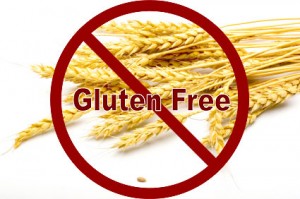 Just when bread thought it was safe to return to store shelves after the Atkins craze, a new trend in dieting is once again taking aim at our beloved carbs. The Gluten Free diet is the newest fad diet promising weight-loss by avoiding all things gluten.
Just when bread thought it was safe to return to store shelves after the Atkins craze, a new trend in dieting is once again taking aim at our beloved carbs. The Gluten Free diet is the newest fad diet promising weight-loss by avoiding all things gluten.
The gluten free diet is nothing new for those who suffer from Celiac disease. Celiac disease is a genetic condition affecting an estimated 1 percent of Americans. People with Celiac disease have to avoid the protein known as, you guessed it, Gluten. Gluten protein is found in wheat, rye, barley, and some grains and causes damage to the lining of the small intestine in those who suffer from it.
So what does this mean for dieters?
I decided to go behind all the eye-catching labels and advertising lures to debunk and better understand what the big deal is about gluten, to help I asked Meghann Scholl RD, LD, a couple questions about how this diet has gained so much popularity and if you could benefit from it.
HT: How do you think the diet got so popular?
MS: First, you have to start by looking at the type of foods that contain gluten. Gluten is in a lot of different types of foods. People who are very strict with avoiding gluten eliminate a lot of food choices. Gluten is obvious in bread, pasta, chips, cookies, cereals, crackers, etc. but it is also in dips, sauces, condiments, beverages, ice cream, etc.
There are plenty of foods that are naturally gluten-free, including fruits, vegetables, beef, poultry, fish, nuts, eggs and more. The common theme tends to become eliminating of grain-based carbohydrates and calorically dense foods. People who decrease their intake of carbohydrates and high-calorie foods usually loose weight and may even feel “less bloated.” This may have lead many people to believing that they have a gluten intolerance and need to follow the gluten free diet.
HT: Would people who don’t suffer from celiac benefit from a gluten free diet?
MS: No. Gluten free diets when followed correctly are very restrictive. Managing celiac disease is not just about eliminating gluten from your diet. It also involves making sure you get all the vitamins and nutrients you need — particularly iron, calcium, fiber and the B-vitamins thiamin, riboflavin, niacin and folate—that are found in fortified grain-based carbohydrates.
Those who follow a gluten free diet but have not been diagnosed with celiac disease by a medical professional put themselves at risk for vitamin and mineral deficiencies.
HT: Can you look into your dietitian crystal ball and tell us about any up and coming diet trends?
MS: I would encourage you to touch on “trendy” diets when it’s pertinent (like gluten free) but also focus on diets that are science-based and are more highly recommended for the general population for lifelong health success (i.e. DASH, TLC, MyPlate, etc)
Bottom Line: Consult with your doctor or a registered dietitian like Meghann Scholl before starting any special type of dieting but with an active lifestyle and general healthy eating you will be on a the right track to a happy and healthy life.
 About the Author
About the Author
Heidi Templeton is a former competitive gymnast and Bay Area yoga instructor specializing in vinyasa, hot, and standup paddle board yoga. Heidi shares her zest for all things health and wellness at www.facebook.com/HeidiFit.